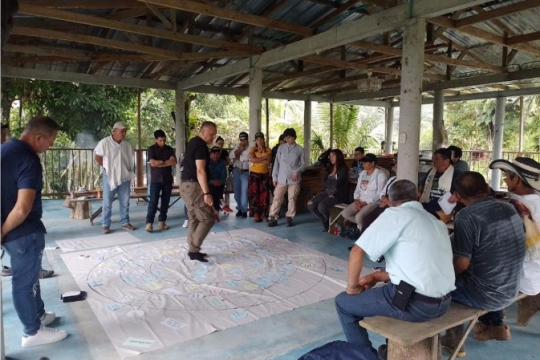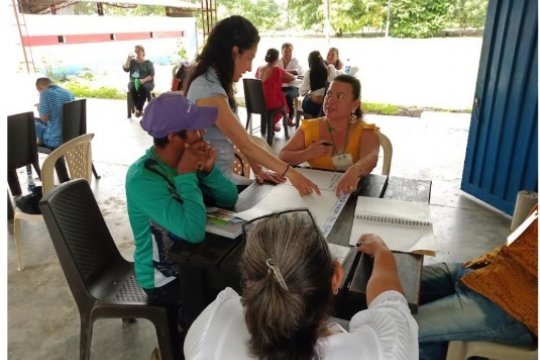Results from a literature review on how countries with internal conflicts manage nature give input to a capacity-building project for a local community that needs to manage its natural resources sustainably after the signature of the peace treaty with Colombian guerrilla FARC-EP.
Luz Angela, EfD Colombia researcher, and WinEED member, is a Professor at the School of Environmental and Rural Studies at Javeriana University in Bogotá. She has conducted a literature review with colleagues to find out how countries with internal conflicts manage nature to promote peace construction. This resulted in a research article. In total, they reviewed 79 articles that had an empirical component and a conceptual framework for peace construction. The articles were about countries that had conflicts at different stages from active conflict to peacebuilding.
Results from the review
They found three main results: first, the literature on peace construction shows that peace is built not only with the reduction or absence of violence but also with improvements in living conditions and equity. Therefore, the main question on environmental peacebuilding is how the improved collective management of natural resources and the building of collective identities may lead to better management of a conflict.
Second, positive results from peace construction are related to collective capacity building, especially if it allows a more equal share of environmental benefits. However, collective capacity building can create tension between citizens and the state, because, through this collective work, citizens can start questioning the legitimacy of the state.
Third, negative experiences from peace construction may arise when natural resource management benefits private interests or increase foreign private investment. In those cases, the peacebuilding efforts increased the gap between the state and citizens’ perception of legitimacy.
The town “La Montañita” as a case of environmental peacebuilding
Luz Angela’s research interest in environmental peacebuilding started with the peace treaty with the FARC guerrilla in 2016. In Colombia, the signing of the peace treaty with FARC-EP guerrilla generated a chance for local communities for sustainable and peaceful territorial development. As an example (1), the town La Montañita, which is on the side of the Colombian Amazon, provides water to nearby town aqueducts and has great biodiversity, but it also has illicit crops and spontaneous colonization that leads to deforestation and livestock farming. There, the presence of the guerrilla FARC-EP had to some extent control of inhabitants and natural resources. Now, with the peace treaty as background, collective organizations started projects with a sustainable resource management approach. Yet, after the peace treaty, these organizations still encounter many challenges such as increasing deforestation and land use disputes.
Luz Angela and her colleagues work together with Agrosolidaria (a network of producers organized to promote fair commerce between the city and rural areas), and with collective organizations in the town La Montañita to build the management capacities of the local community. This capacity-building program is a social responsibility project led by Javeriana University. Within this project, Luz Angela and colleagues have delivered courses and workshops in the areas of territory planning, ecosystem services, water management, gender, and public policy.
“Considering communities' perceptions after participating in the courses and workshops, we think that increasing capacities empowers the local population that has been highly affected by violence to develop their territory sustainably”, says Luz Angela.
She considers that this is consequent with the second finding of her literature review, according to which there is evidence of positive results from peace when there is a collective capacity to manage and socially share the benefits from exploiting natural resources.
Currently, the Javeriana University and the local community at La Montañita are building an agreement for the territory to integrate the results of this capacity-building process and to provide evidence for environmental peace construction.
-
Read more about the experience of town “La Montañita” here (in Spanish).
By: Manuela Fonseca (comm officer-EfD Colombia)

